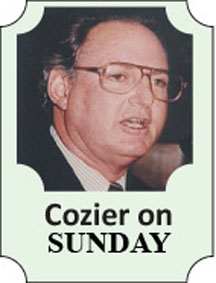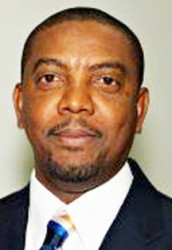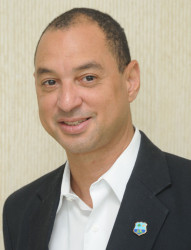The West Indies Cricket Board (WICB) confirmed at its annual general meeting in Jamaica last weekend that its name was to be changed to Cricket West Indies.
 It was a retitling first promoted in the comprehensive Patterson Report on its governance and structure in 2007, prepared by a committee headed by the former Jamaica prime minister. Like other key points, it has remained dormant in the nine years since as, in the interim, Australia, New Zealand and South Africa have made switches.
It was a retitling first promoted in the comprehensive Patterson Report on its governance and structure in 2007, prepared by a committee headed by the former Jamaica prime minister. Like other key points, it has remained dormant in the nine years since as, in the interim, Australia, New Zealand and South Africa have made switches.
Patterson explained at the time that the new name would reflect the difference in the WICB’s governance structure as recommended by his panel. That ‘difference’ is yet to be realised in spite of the committee’s caveats that “change must be effected urgently” and that “the status quo is not an option.”
Under pressure from Caribbean governments (CARICOM) that have insisted on the implementation of the main item of its review committee, presented last November as the latest of four of its kind, the WICB tackled the subject of transformation at its Jamaica meeting.
It issued two statements afterwards that blurred the question as to whether or not it intends to follow the lead of Australia and New Zealand in meaningfully reorganising itself.
One came from the shareholder boards. The six – Barbados, Guyana, Jamaica, Leeward Islands, Trinidad & Tobago and Windward Islands – strongly supported the WICB’s earlier rejection of CARICOM’s independent panel.
Established jointly by CARICOM and the WICB under principal of the University of the West Indies (UWI) Barbados campus, Dr. Eudine Barriteau it included presidents of the Caribbean Court of Justice, Sir Dennis Byron, and the Caribbean Development Bank, Warren Smith and former West Indies vice-captain Deryck Murray.

Its main proposal was that the board should be immediately dissolved and its current members resign while a differently constituted alternative was assembled. It was a pill too bitter to swallow. WICB president Dave Cameron, who has risen to the top of the WICB after 14 years in the directorate in one position or another, used forthright language to accuse the report of making “findings and recommendations…not supported by the facts.”
It was, he said, “wrong to blame governance of the WICB for the team’s performances on the field.”
At the same time, Cameron announced the formation of a panel of ‘experts’ to assess the proposals not implemented from the earlier reports on governance.
It is to be led by Don Wehby, a Jamaican business executive, now government senator and former cabinet minister. He and two others, Clifford Reis of Guyana and Ricky Skerritt, an earlier West Indies team manager, are non-voting WICB directors; three non-aligned members are to be added.
Cameron said it would focus primarily on the recommendations of committees under Trinidad & Tobago high court judge Anthony Lucky in 2004, Patterson in 2007 and St. Kitts-Nevis Queen’s Counsel Charles Wilkin in 2012 that were shelved.
Its remit was to examine “if there is an opportunity to bring anything back to the territorial boards and the WICB for adoption by the shareholders.

“Once that process is complete, a change management expert will be brought in to complete the process for a smooth transition,” Cameron added.
It sounded very much as if Wehby’s group was expected to endorse the earlier proposals from Patterson and Wilkin and present them to be stamped by the member boards and the WICB itself. If so, they would find it a very hard sell.
History indicates that the WICB directors would once more dig their heels in, as they have done over the years. They have repeatedly rejected submissions from the various reports reviewing its governance and structure. The latest rebuff has so frustrated CARICOM that the two are no longer on speaking terms.
Patterson and Wilkin echoed each other’s propositions almost word for word and Barriteau’s all to the stipulation that the WICB be immediately dissolved.
Patterson’s plan was for two-tier system – a Cricket West Indies Council and a Cricket West Indies Board.
The Council, drawn from “a wide range of stakeholders,” 23 was the suggested number, would meet once a year “to review the state of West Indies cricket.”
The Board would be the executive arm of Cricket West Indies to act within the ‘broad outlines’ settled by the Council.
Wilkin’s group projected a board reduced to 15, comprising president, vice-president, representatives of the territorial boards cut from two to one each, six directors elected from outside the board and the chief executive officer as an ex-officio director.
Four years after handing his report to the WICB, Patterson charged that its main point for restructuring was ignored was “because it would have resulted in some degree of openness which does not exist in the present situation.
“I wasted a year after retirement (preparing the report),” he lamented.
Both he and Wilkin concluded that the directors were hostile to their suggested changes centred on their intention to protect their positions on the board.
In the circumstances, it is unrealistic to believe that WICB directors would suddenly do a complete U-turn and agree to restructuring of the organisation, whatever Wehby’s committee finds pertinent in reports that have gathered dust for years while West Indies cricket has increasingly staggered in the international game that it once dominated throughout the 1980s.
Hope still lingers that it might finally be moved by the reality that if it does not accept the need for reform, the revival that has been elusive for two decades will remain that way.









